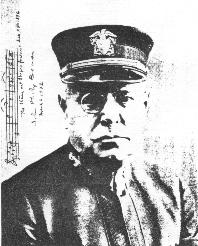

|
 |
John Philip Sousa
|
 |
Excerpts from "John Philip Sousa, An American Phenomenon" by Paul E. Bierley, published by Integrity Press
John Philip Sousa was the symbol of an era and was known as the man who did one particular thing better than any other. He was to the march what Johann Strauss was to the waltz, and he has been described as the "Dickens of Music," the "Kipling of Music," the "Berlioz of the Military Band," the "Knight of the Baton," and so forth. He was one of the Horatio Alger types of premodern music, leading a fabulously triumphant double career for over half a century. He stood alone among composers who toured with their own musical organizations and was the most successful bandmaster in musical history. His band, which many say has never been surpassed, was a living legend, and his art appealed both to a person's emotions and to his intellect.
He came along at precisely the right moment in history, and his marches are an imperishable reflection of his country's spirit. Their bright optimism and driving pulsation said, in effect, "We'll stand up to anything," just as the burgeoning, dynamic United States of America was saying.
Sousa's marches have stood the test of time and have become classics of a sort. Amazingly, they were not only marched to but they were also widely used for dancing for a period of about twenty years. His "Washington Post" became the standard of the ballroom as the two-step replaced the waltz for dancing. Evidence of his popularity is preserved in such contemporary accounts as this:
In the military camp, in the crowded streets of the city when the troops march to the front, in the ballroom, in the concert hall, at the seaside and in the mountains, go where you may, you hear Sousa, always Sousa.
It is Sousa in the band, Sousa in the orchestra, Sousa in the phonograph, Sousa in the hand organ, Sousa in the music box, Sousa everywhere...As a conductor, Sousa is of the people and for the people... The influence of his concert work among the masses is incalculable and the Sousa Band is ever the pioneer in the cause of good music.
Sousa made his mark in the world not only as a composer but also as an entertainer. He spurned the opportunity for a musical education in Europe and chose instead the world of entertainment. By the time his band had made its early twentieth century tours of Europe, the name Sousa was a household word on two continents. Today it may seem incredible, but for a short period he was actually the best-known musician in the world and was regarded as one of the most important musical figures.
By the late 1890s Sousa was recognized as much more than a popular composer; he was considered one of the most polished conductors of the Western world. Because of his broad understanding of classics, he towered head and shoulders above other band conductors. The fact that he was the conductor of a concert band instead of a symphony orchestra had little apparent effect on his status. Successes in the field of operetta gave him a further measure of respect. He electrified his listeners with his style of conducting and inspired his musicians to greater efforts. Other evidences of his prestige as a conductor were seen in the countless imitations of him by vaudeville comedians.
It can be said that he developed his natural gifts to the greatest degree. He composed without a piano or the aid of any other musical instrument or device, something which the layman might think impossible. Throughout his life he emphatically stated that his music came not from within, but from a "higher source."
Sousa, The Man
Sousa was a veritable fountain of sparkling humor, but his wit was of the dry, subtle variety. One of Sousa's humoresques, "The Mingling of the Wets and Drys," gave rise to an incident which pointed up his sense of humor. For several years the Sousa Band had played at Ocean Grove, New Jersey, a mecca of the Methodists. Upon hearing that Sousa was planning to play a composition based on drinking songs, they protested, whereupon he substituted another humoresque entitled, "Follow the Swallow." The Methodists failed to see the humor of it, however, and never invited him back.
He had personal peculiarities, but they caused hardships to no one. For instance, he did not carry a watch or matches until his final years. Also, he seldom carried over two dollars on his person. And the personal letters of his late years were written entirely on the right-hand side of the page. His most published eccentricies were his use of new white gloves for nearly every concert and his collection of dozens of pairs of custom-made shoes, which he reportedly had insured for $5,000.
Punctuality was one of Sousa's virtues. Paraphrasing an old quotation, he often remarked that punctuality was the politeness of kings. When a Sousa Band concert was scheduled for eight o"clock, it began promptly at eight o"clock, and when the train pulled out of the station, Sousa had been there waiting for half an hour. The same could not be said for his wife, whom he sometimes referred to as "the late Mrs. Sousa."
Morally, Sousa was a man of highest ideals. This was revealing and succinctly stated by one of his former managers, who observed that Sousa gave the general impression of one trying diligently to be the most honorable man who ever walked the face of the earth. He did not compose on Sundays and wore a white uniform on Sundays, while on weekdays he usually wore black.
He steadfastly proclaimed that he would never retire or give a "farewell" concert. When newspaper reporters sensed the end of his career and asked the inevitable question, his ready reply was, "When you hear of Sousa retiring you will hear of Sousa dead!" He was sensitive to even the most subtle hints of feebleness and secretly had his conducting podium lowered inch by inch so his lack of agility would not be obvious. He, indeed, did conduct until the night of his death. The last composition ever played under his baton was his own immortal "Stars and Stripes Forever."
There were four major turning points in Sousa's life. The first was at the age of thirteen, when his pians for running away with a circus band were interrupted by his father, who enrolled him as an apprentice in the U.S. Marine Band. The second, at age twenty, was when he decided against a European musical education after his release from the Marine Corps. The third was when he was appointed to the leadership of the Marine Band at the age of twenty-five, after seemingly being headed for a career in theater music. The fourth came after twelve years as leader of the Marine Band, when he resigned to organize his own band. If he had chosen an alternative at any of these critical times, the world would have seen a different John Philip Sousa.
The Sousa the world did see left a heritage of martial music. He standardized the march form as it is known today. At a time when countless thousands of marches competed for the public's favor, Sousa's outdistanced the competition. He was exceptionally inventive within the restrictive bounds of the common march and added colorful and imaginative titles as a bonus. While some countries seem to prefer the music of their native march composers and while the quality of certain individual marches may be debated, the fact remains that Sousa composed a far greater number of marches of enduring quality than any other composer.
The distinguished music critic Olin Downes once stated that Sousa could put more ideas into fewer measures than any other composer (Boston Post, September 17, 1922). More astonishing than this was his resourcefulness. He repeated himself only in style; his marches differ from one another to such a degree that defining this style is an onerous task. "The Washington Post" remained foremost among marches, its name being synonymous with the two-step, until the two-step was supplanted by the fox-trot about the time of World War I. Sousa considered "Semper Fidelis" his finest march, but his public has decided upon "The Stars and Stripes Forever" as his masterpiece. It has been said by many writers that he would have achieved immortality had he written no other march than this.